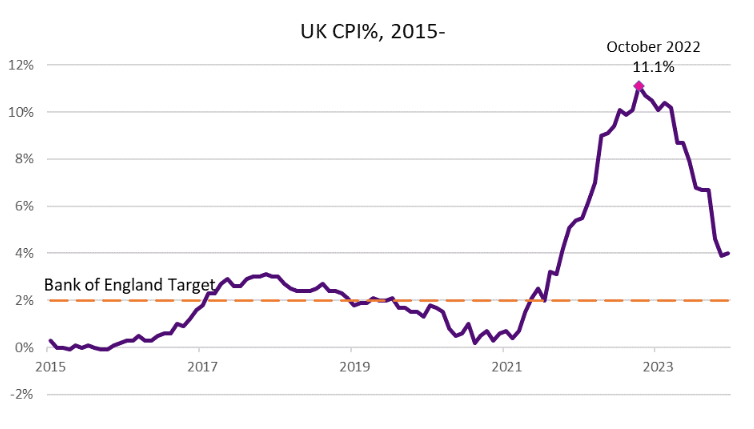How accurate are the headlines about Britain’s economy? Arguably, media outlets often focus on negative events, data and forecasts because negative headlines are twice as likely to get clicks. The result, however, is that public perceptions of reality can easily become distorted or overly cynical.
In this article, our Teesside financial planners take a closer look at some of the key economic indicators to assess how the UK is performing in 2024, and what could lie ahead. We hope these insights are useful to you.
Please contact us for more information or to speak with a financial adviser:
t: 01228 210 137`
e: [email protected]
Inflation
Throughout 2023, much of the concern about the UK economy has focused on inflation after levels peaked at 11.1% in October the previous year. In more positive news, CPI inflation was reported at 4.0% in the 12 months to October 2023. Albeit a slight increase from 3.9% in November 2023, and notably double the Bank of England’s (BoE) target rate of 2.0%.

The “sticky” part of UK inflation is the services sector which comprises the vast majority of our economy. Here, prices are still rising quite quickly – standing at 6.4% in December 2023. This is driven heavily by wage increases for those working in UK services. These are still rising quite fast; again too fast to be consistent with the Bank of England’s (BoE) 2% inflation target.
To control inflation, therefore, the BoE will likely be looking at pushing down wage growth in 2024. This typically has quite painful results for an economy – i.e. a rise in unemployment, a recession, or both. In light of this, what does the UK job market look like right now?
Employment
Analysts sometimes talk about the “tightness” of the UK labour market. This refers to the ratio of available jobs (vacancies) in the economy relative to the number of people out of work.
In 2023, the UK labour market was widely regarded as very tight – i.e. unemployment was low and many organisations were advertising for workers. This was a helpful safeguard against recession last year, although the UK economy sailed quite close to it.
Recent figures suggest that the UK labour market has “loosened” slightly – although not at the cost of huge unemployment. This raises hopes that the UK may be able to navigate a “soft landing” (controlling inflation without falling into recession) for its economy in 2024, although significant uncertainties remain.
The Housing Market
Both analysts and ordinary British citizens tend to have a deep interest in house prices. Homeowners typically want to see their property’s value go up. First-time buyers might like for prices to come down!
Rising valuations tend to be seen as a sign of economic health because consumers feel wealthier – increasing their confidence and willingness to spend. The ONS currently estimates that UK house prices are falling year-on-year. In the 12 months leading to November 2023, for instance, average prices fell by 2.1%.
The rate of falling is accelerating in 2024 – not at huge rates, but the fall is significant. London and the South West are experiencing the sharpest rates of price falls.
This overall decline can partly be explained by the large number of homeowners who are finishing the fixed-rate mortgage deals taken out before 2022 (when interest rates shot up). Many people will be facing higher monthly payments this year – making it less likely that people will want to move and take out a bigger mortgage. With less demand for houses, and with mortgages being more expensive for those looking to move, prices have naturally fallen slightly.
It is worth noting that, although the UK housing market might struggle in 2024, it seems unlikely that a major crash is imminent. Demand continues to outstrip limited supply across the country and the wider economy is not facing a cliff edge. It would not be a surprise to see house prices rise in 2024.
National growth
Gross domestic product (GDP) measures the rate of change in output in a national economy. For instance, if the UK grows by 2.5% per year then its output would double every 30 years. However, what did GDP look like last year, and what could it be in 2024?
It is difficult to assess GDP in 2023 since the figures for the fourth quarter (Q4) are still being gathered. Yet Q3 showed no growth in real GDP according to the Office for National Statistics (ONS). Looking ahead, many forecasts predict weak growth in 2024 (e.g. 0.5% according to KPMG) or even none at all.
These forecasts are broadly in line with other European countries like Germany, Italy and France – although projections for the US economy are more optimistic.
Overall, the UK economy can be justifiably described as “muddying along” in early 2024. Looking ahead, there are no major grounds for alarm or celebration.
The market seems to be pricing a high degree of uncertainty into UK stock markets at the moment – perhaps partly due to uncertainty over a possible election later this year. This year could be a great time to start investing with a financial adviser if you like the idea of including some long-term value opportunities in your portfolio.
Invitation
If you would like to discuss your financial plan and investment strategy, then we would love to hear from you. Get in touch with your Financial Planner here at Vesta Wealth in Cumbria, Teesside and across the North of England.
Reach us via:
t: 01228 210 137
e: [email protected]
This content is for information purposes only. It should not be taken as financial or investment advice. To receive personalised, regulated financial advice regarding your affairs please consult your Financial Planner here at Vesta Wealth in Cumbria, Teesside and across the North of England.

